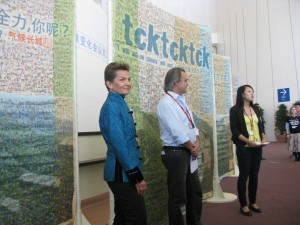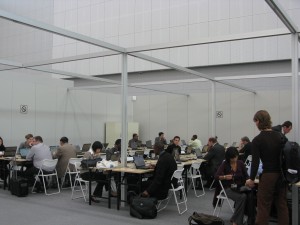It’s the Politics, Stupid
Posted on 09. Oct, 2010 by astark in U.S.A.
It seems like every day for the past year pundits have been tolling the death knell of the UNFCCC negotiating process. The latest is this New York Times article claiming that there are “poor prospects” for success at the Cancun meeting this December based on what has happened this week in Tianjin. While the closing plenary session has yet to get under way, and this week has been plagued with tensions over disagreement and a slow pace in some of the negotiations, the meeting has also most likely made progress. For one thing, the rumor on the technology transfer side is that countries have already reached agreement on a final negotiating text for Cancun, and the discussions have had a very positive vibe. There has also been a lot of buzz about the Kyoto Protocol negotiations, with Norway, Australia and others reconfirming their commitment to a second period of agreement in plenary last night and even traditional laggards like Russia and Venezuela making positive noises about joining a second agreement. There is a lot of concern that the negotiations are coming down to the wire since Kyoto is set to expire in 2012 (the next two years are like a blink of the eye in international negotiation land), but Mexico and the EU are said to be discussing a proposal for a 2 year extension of the Kyoto Protocol for the interim period.
It’s silly to give up hope now. Reaching consensus amongst more than 200 countries of all different shapes and sizes was never going to be easy, especially when their economies and

their people will be so deeply affected by the outcome. A consensus-driven process is by it’s very nature slow and difficult because every player, approaching the table with different perspectives and interests, will only agree to a decision that they see as beneficial to themselves.
But consensus is also the best, and the only, way for the world to truly tackle climate change. The tracker team got the opportunity to chat with Christiana Figueres, the Secretary General of the UNFCCC, for about half an hour this morning, and I have to say that her remarks gave me a lot of hope. She pointed out that the UNFCCC process has value because “climate isn’t just about mitigation:” if it were, the biggest economies could simply get together and thrash out a deal amongst themselves. But it’s really about striking the right balance between mitigation efforts and helping the most vulnerable countries and people to adapt to the effects of climate change, and that’s one reason why both the small and the large countries must be present at the negotiating table.
She also pointed out that we shouldn’t have expected in the first place that solving the climate change problem would be quick or easy. Climate change’s impacts, and the energy transformation that countries will have to undertake, will be fundamentally the greatest transformation that humanity has ever seen, and undertaking this transformation will take a lot of time, energy and hard work. Thus it is understandable that these negotiations are an incredibly complex process. But it is also the best process, because it allows every country a voice.
Thus as difficult as the process may be, it is also worth investing in a consensus-driven process, because every player will have a stake in the outcome and therefore will be more likely to comply with the decisions that are made in a final agreement.
I think there’s also a more specific reason that the negotiations are not succeeding as well as many have hoped. That is because instead of approaching the negotiations in the spirit of finding a global agreement, every country has clung to its own self-interest. Instead of offering concessions in pursuit of an agreement to save the planet and its people, countries are deliberately blocking the negotiations or pointing fingers at one another to explain why the negotiations aren’t proceeding. I actually think that in a lot of ways, ordinary people from these countries are far ahead of their own negotiators, even though negotiators often claim that they are negotiating in their citizens’ interests. At the negotiations, I’ve seen Chinese and Western NGOs dialoging in unprecedented ways, looking for solutions to the current negotiation deadlocks and engaging in actions on the ground, like the Global Work Party that will take place this Sunday, to show politicians that they are rolling up their sleeves and getting to work, even if negotiators are not.
I think that all of this goes to show that the UNFCCC process isn’t broken, and that it remains the best way to tackle global climate change issues. What’s broken is the politics- it really is all about the politics (not the economy), stupid. Rather than heeding the call of the amorphous concept of “national self interests,” politicians should listen to their own people this Sunday, October 10th. The planet is waiting.
Negotiator Tracker - Alex Stark
Alex Stark joins the project from Washington DC, where she's focused on legislation addressing drivers of violent conflict around the world, including the effects of climate change. Tracking the US negotiators and getting the word out about action inside the UNFCCC combine her passions for activism, sustainable development, conflict prevention and US foreign policy. read more»
Read more of Alex's posts here.
Follow Alex on twitter @AlexMStark







